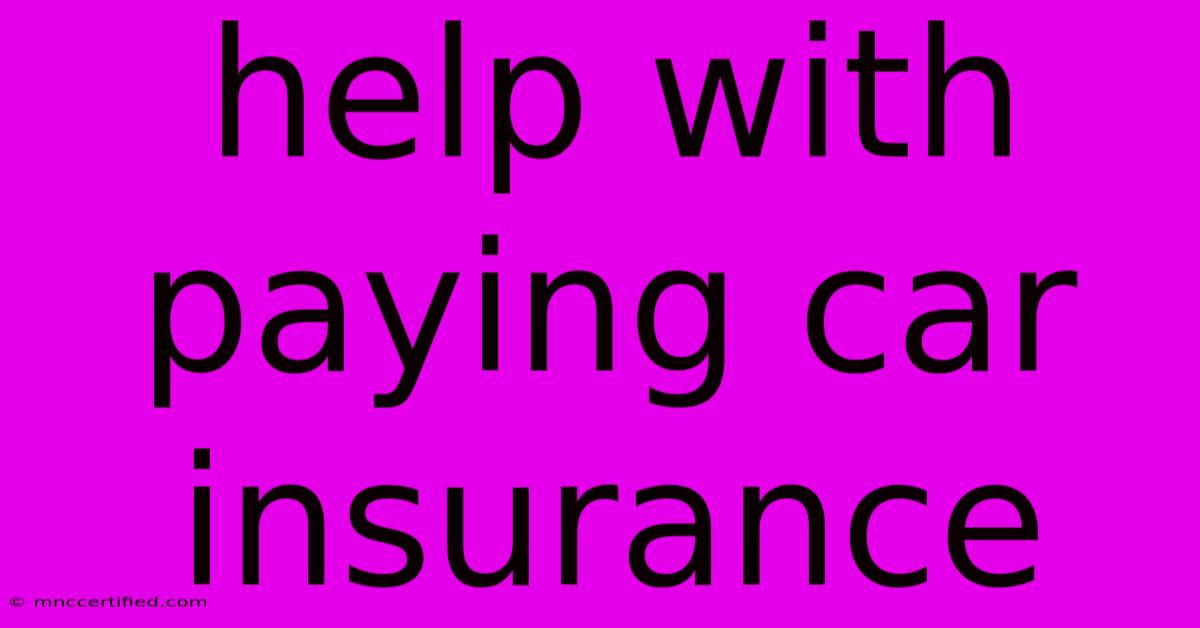Help With Paying Car Insurance

Table of Contents
Help with Paying Car Insurance: Strategies for Managing Costs
Paying for car insurance can be a significant expense, but there are several strategies you can use to manage costs and find help when you need it. This comprehensive guide explores various options to alleviate financial pressure related to your car insurance premiums.
Understanding Your Car Insurance Costs
Before exploring ways to reduce your costs, it's crucial to understand the factors influencing your premium. These include:
- Your driving record: Accidents and traffic violations significantly impact your premiums. A clean driving record is key to lower costs.
- Your vehicle: The make, model, and year of your car affect insurance rates. Luxury cars and high-performance vehicles generally cost more to insure.
- Your location: Insurance rates vary based on your location due to factors like crime rates and accident frequency.
- Your coverage: Comprehensive and collision coverage offer more protection but come with higher premiums. Liability-only coverage is cheaper but offers less protection.
- Your age and gender: Statistically, younger drivers and males tend to pay more due to higher risk profiles.
- Your credit score (in some states): In certain states, your credit score is a factor in determining your insurance rates.
Strategies to Lower Your Car Insurance Costs
Several strategies can help lower your car insurance payments. These include:
1. Shop Around and Compare Quotes
Don't settle for the first quote you receive. Use online comparison tools to get quotes from multiple insurers. This allows you to compare coverage options and prices to find the best deal. Key tip: Be sure to compare apples to apples – ensure the coverage levels are the same across all quotes.
2. Increase Your Deductible
Raising your deductible (the amount you pay out-of-pocket before your insurance coverage kicks in) can lower your premiums. This is a cost-effective strategy if you can comfortably afford a higher deductible in case of an accident.
3. Bundle Your Insurance
Many insurers offer discounts for bundling your car insurance with other types of insurance, such as homeowners or renters insurance. This can lead to significant savings.
4. Maintain a Good Driving Record
Safe driving habits are crucial. Avoiding accidents and traffic violations can substantially reduce your premiums over time. Defensive driving courses can sometimes lead to discounts.
5. Explore Discounts
Inquire about available discounts, including:
- Good student discounts: For students with good grades.
- Multi-car discounts: For insuring multiple vehicles under one policy.
- Anti-theft device discounts: For cars equipped with anti-theft systems.
- Driver training discounts: For completing approved driver safety courses.
6. Consider Usage-Based Insurance
Some insurance companies offer usage-based insurance programs that track your driving habits. If you're a safe driver, you might qualify for lower premiums based on your driving data.
Seeking Financial Assistance with Car Insurance
If you're struggling to pay your car insurance, several options can provide assistance:
- Payment plans: Contact your insurer directly to discuss payment plan options. Many insurers offer flexible payment plans to help manage costs.
- Government assistance programs: Depending on your location and financial situation, you might qualify for government assistance programs that can help with car insurance costs. Research local and state resources.
- Charitable organizations: Some charitable organizations offer financial assistance for car insurance to individuals facing hardship.
Preventing Future Car Insurance Issues
Proactive measures can prevent future struggles with car insurance payments:
- Budgeting: Include car insurance as a regular expense in your monthly budget.
- Emergency fund: Build an emergency fund to cover unexpected car repairs or insurance costs.
- Regular car maintenance: Proper car maintenance can help prevent accidents and reduce the likelihood of costly repairs.
By implementing these strategies and seeking help when needed, you can effectively manage your car insurance costs and maintain financial stability. Remember that proactive planning and responsible driving habits are essential for long-term affordability.

Thank you for visiting our website wich cover about Help With Paying Car Insurance. We hope the information provided has been useful to you. Feel free to contact us if you have any questions or need further assistance. See you next time and dont miss to bookmark.
Featured Posts
-
Sheffield United Defeat Oxford United 3 0
Nov 27, 2024
-
Mack Brown No Unc Return In 2025
Nov 27, 2024
-
9000 Sign General Election Petition Warrington
Nov 27, 2024
-
Sunderland U21s 1 2 Sheffield United U21s
Nov 27, 2024
-
Coles Grieves Late Partner
Nov 27, 2024